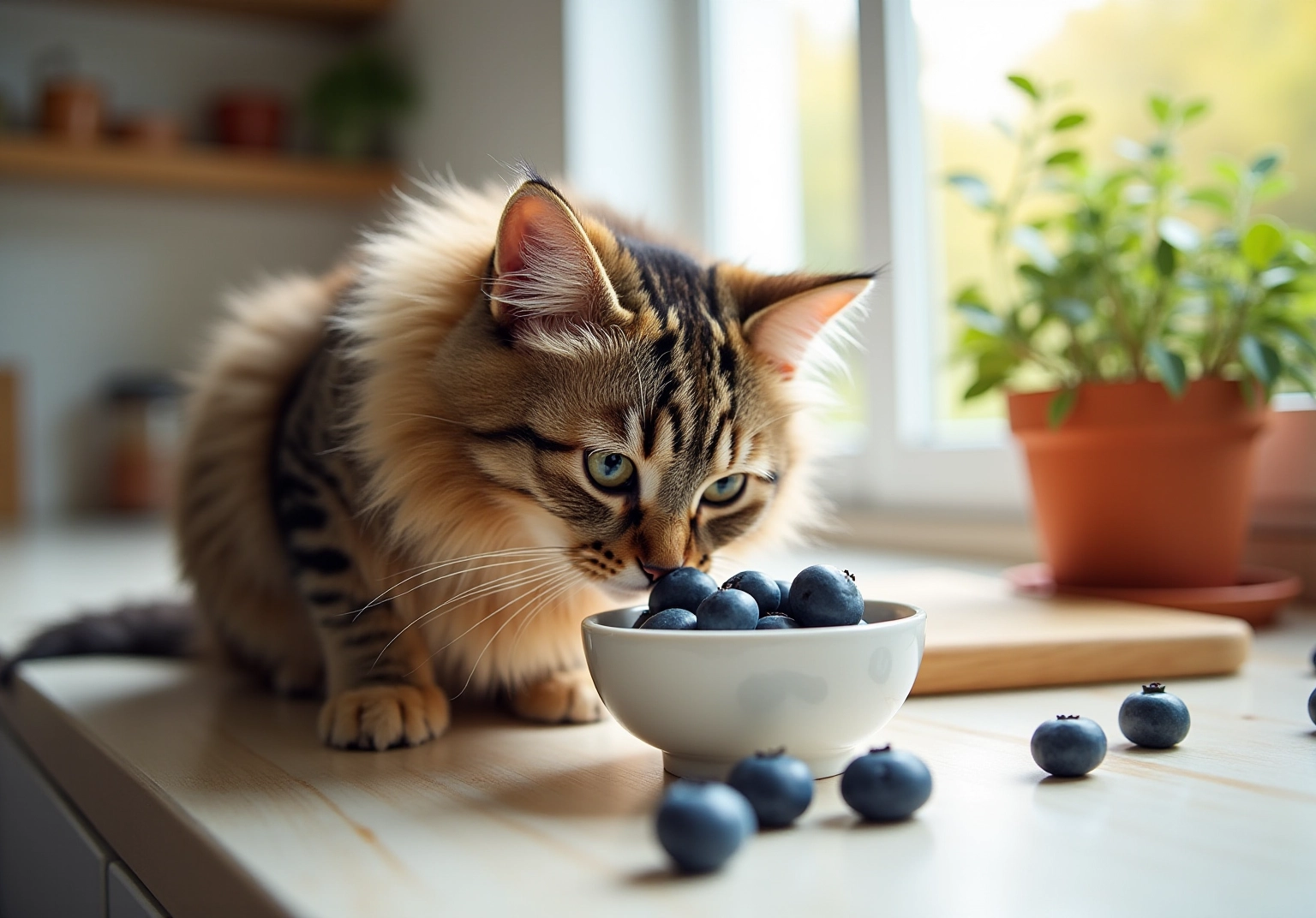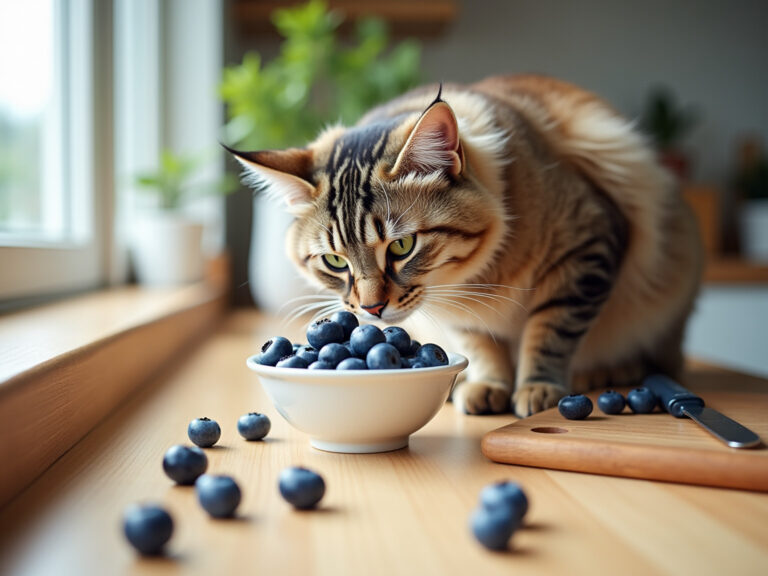Are Blueberries OK for Cats? Understand Benefits and Risks
Overview
As a caring pet owner, you may wonder about the safety of blueberries for your furry family members. The good news is that blueberries can be safe for cats when offered in moderation. These little fruits provide delightful benefits such as antioxidants, vitamins, and hydration, making them a healthy treat that should comprise no more than 10% of their diet.
However, it’s essential to monitor your cat for any digestive issues and consult a veterinarian before introducing blueberries into their diet. This ensures that their primary nutrition remains high in quality protein, which is crucial for their overall health.
At Adventure Den, we understand your concerns about pet care, and we’re here to support you in nurturing a safe and loving environment for your beloved pets.
Introduction
Curiosity often drives pet owners to explore new dietary options for their furry family members, and blueberries have emerged as a popular topic of discussion. These small, vibrant fruits are not only low in calories but also packed with antioxidants, vitamins, and fiber, potentially offering health benefits to our beloved feline companions.
However, the question remains: are blueberries truly safe for cats, and how can they be incorporated into a balanced diet without posing risks? Understanding the fine line between nutritious treats and dietary hazards is essential for ensuring the well-being of your cherished pets.
At Adventure Den, we believe that nurturing your pet’s health is a priority, and we are here to guide you through these important dietary choices.
Explore the Basics of Cat Nutrition and Blueberries
As a loving pet owner, you may wonder about the best diet for your feline friend. Cats are obligate carnivores, meaning their diet primarily consists of meat. However, they can enjoy the occasional fruit, such as small berries, in moderation, but are blueberries ok for cats? When considering your cat’s diet, it’s important to ask if are blueberries ok for cats, as they are low in calories and rich in antioxidants, vitamins C and K, and fiber, all of which can support your cat’s immune system and overall health.
It’s important to remember that fruits should only make up a small portion of your cat’s diet—ideally no more than 10 percent. For example, your cat can safely enjoy up to three berries at a time, but it’s best to limit this to just a few times a week to avoid digestive issues like diarrhea or vomiting. Always wash these fruits thoroughly to remove any dirt or pesticides before sharing them with your furry family member.
Before introducing any new foods, consulting with a veterinarian is a wise step to ensure they meet your cat’s specific dietary needs. While these delightful small fruits can serve as a tasty treat, they should complement a balanced diet primarily made up of high-quality cat food, which should constitute about 90 percent of their meals.
As nutritionist Karina Carbo-Johnson mentions, not all felines will take to blueberries, which leads to the question: are blueberries ok for cats? It’s a good idea to offer them multiple times to see if your pet shows interest. By understanding and addressing your cat’s dietary preferences, you can create a nurturing environment that supports their health and happiness.

Assess the Benefits and Risks of Blueberries for Cats
Blueberries can offer several wonderful benefits for your furry family members, including:
- Antioxidant Properties: Rich in antioxidants, blueberries help combat oxidative stress, supporting overall health and potentially enhancing cognitive function in older cats.
- Vitamins and Minerals: These berries are a source of essential vitamins such as C and K, which play a crucial role in immune function and bone health.
- Hydration: With their high water content, these fruits can aid in hydration, especially for felines that might not consume sufficient water.
- Low in Calories and High in Fiber: Blueberries are low in calories and rich in dietary fiber, making them a nutritious snack for your beloved pets.
However, there are important risks to consider:
- Digestive Issues: Excessive consumption of blueberries can lead to gastrointestinal upset, including symptoms like vomiting or diarrhea.
- Sugar Content: Although naturally present, the sugar in these berries can pose a concern for overweight or diabetic felines, making moderation crucial.
- Allergic Reactions: Although rare, some cats may have allergies to certain fruits. It’s important to monitor for any adverse reactions when incorporating this fruit into their meals.
- Portion Control: It is advisable to limit servings to no more than two or three berries at a time to avoid digestive discomfort.
While including blueberries in your cat’s nutrition can be advantageous, it’s essential to ask if are blueberries ok for cats and to approach this addition carefully and in moderation. Always ensure that the main emphasis stays on a balanced meal abundant in protein. Consulting a veterinarian prior to introducing these fruits is essential, particularly to find out if are blueberries ok for cats with health issues, to guarantee their safety and well-being.

Implement Safe Practices for Feeding Blueberries to Cats
Incorporating blueberries into your cat’s diet raises the question of are blueberries ok for cats as a delightful way to enhance their nutrition. To do this safely, please consider the following caring guidelines:
- Start Small: Begin with just a few berries to see how your furry family member reacts. This gentle approach allows you to monitor their tolerance and preferences, ensuring a positive experience.
- Wash Thoroughly: Rinse these fruits under running water to remove any pesticides or chemicals that could pose a risk to your cat’s health. Your pet’s safety is paramount.
- Serve Fresh or Frozen: While fresh fruits are the best choice, frozen blueberries can provide a refreshing snack, especially during those warm summer days.
- Monitor Reactions: After introducing the fruit, keep a watchful eye on your cat for any signs of digestive upset or allergic responses, such as vomiting or diarrhea. Remember, excessive fruit consumption can lead to digestive issues, so when considering if are blueberries ok for cats, ensure that they make up no more than 10% of your cat’s daily calorie intake.
- Consult Your Vet: If you have any concerns or if your cat has pre-existing conditions, it’s always wise to consult your veterinarian before adding these fruits to their diet. This step is essential for prioritizing your cat’s well-being and safety.
By following these best practices, you can safely enrich your cat’s diet with blueberries, while considering if are blueberries ok for cats, thus nurturing their health and happiness.

Conclusion
Incorporating blueberries into your furry family member’s diet can provide a delightful and nutritious treat, but it’s essential to approach this addition with care. While blueberries are low in calories and rich in beneficial nutrients, they should only be offered in moderation, ensuring that the primary focus remains on a balanced diet primarily composed of high-quality cat food.
The numerous benefits of blueberries are worth noting, including:
- Antioxidant properties
- Essential vitamins
- Hydration support
However, it’s important to remain aware of the potential risks, such as:
- Digestive issues
- Allergic reactions
Understanding the proper portion sizes and safe practices for introducing this fruit is crucial for maintaining your cat’s health.
Ultimately, we encourage all pet owners to consult with a veterinarian before introducing blueberries into their cat’s diet. This step ensures that the dietary choices made align with the specific health needs of each cat, fostering a safe and enjoyable experience. By prioritizing informed decisions and moderation, you can enhance your cat’s nutrition while keeping their well-being at the forefront.
Frequently Asked Questions
Can cats eat blueberries?
Yes, cats can eat blueberries in moderation. They are low in calories and rich in antioxidants, vitamins C and K, and fiber, which can support your cat’s immune system and overall health.
How much of a cat’s diet can consist of fruits like blueberries?
Fruits should only make up a small portion of your cat’s diet, ideally no more than 10 percent.
How many blueberries can I give my cat at a time?
You can safely give your cat up to three blueberries at a time, but it’s best to limit this to just a few times a week to avoid digestive issues.
Should I wash blueberries before giving them to my cat?
Yes, always wash blueberries thoroughly to remove any dirt or pesticides before sharing them with your cat.
Is it necessary to consult a veterinarian before introducing blueberries to my cat’s diet?
Yes, it is wise to consult with a veterinarian before introducing any new foods to ensure they meet your cat’s specific dietary needs.
What should the majority of a cat’s diet consist of?
The majority of a cat’s diet should consist of high-quality cat food, which should make up about 90 percent of their meals.
Will all cats enjoy blueberries?
Not all cats will take to blueberries, so it may be a good idea to offer them multiple times to see if your pet shows interest.



